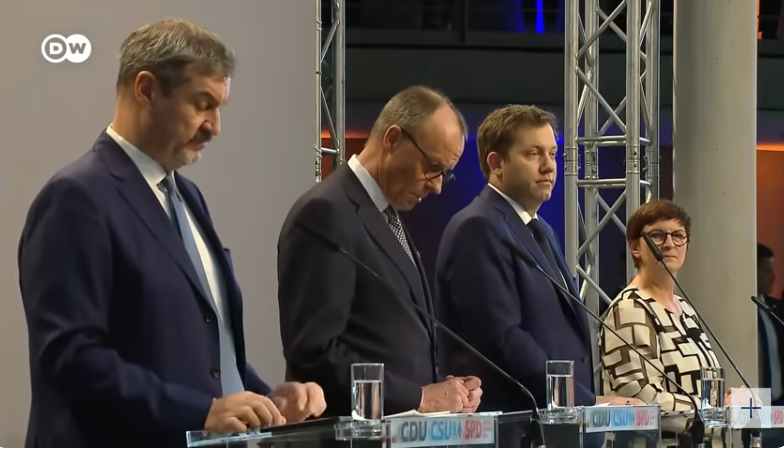In the coalition agreement between the CDU/CSU union parties and the SPD social democrats in Germany, one section in particular is causing controversy in Germany.
The coalition agreement states that they want to «combat disinformation» – false or misleading information that is deliberately spread to damage trust in those in power, the government and German authorities. It also states that the «independent media monitoring» will counteract «hatred, incitement and information manipulation».
It’s the section «Handling disinformation» that causes reactions. There you can read the following: «Deliberately spreading false factual claims is not covered by freedom of expression.»
The independent media authority should therefore, among other things, «while preserving freedom of expression» also «take action against hatred and incitement» and «information manipulation», writes BILD.
As the paragraph is worded, there is now a growing fear that Germany’s new government will ban lying. But what is a lie?
According to media lawyer Joachim Steinhöfel (62), facts can be proven, unlike opinions. The fact becomes untrue when you say something that is not true.
But even this is more complicated than many people think at first glance, as the history of science has showed us. Before Kepler, it was a fact that celestial bodies moved in perfect circles, but after Kepler discovered that the planets moved in ellipses, the old truth about circles was transformed into a lie.
Before Einstein, it was an undisputed fact that light travelled in a straight line. But Einstein’s theory of relativity said that light bent by gravity. This was confirmed by a famous test many years later.
This is precisely why only people who do not understand what science is in practice can say something as stupid as The science is settled. Because science is NEVER 100 per cent settled. Therefore, no one can define truth with absolute certainty, as there are countless examples of.
Law professor Volker Boehme-Neßler is critical of the new lie law. Because even small everyday lies will be punishable as the law is formulated.
– I’m allowed to talk rubbish, even if I make a fool of myself. That’s my freedom. The state interferes massively in everyday life here.
Criminal lawyer Udo Vetter believes that the text of the law violates the German constitution.
– Nowhere is it written that one is obliged to convey only true facts.
Attorney Steinhöfel agrees.
– Our criminal code does not even contain this sentence. The phrase is so vague that it is not permitted in a constitutional state.
He warns that the bill could criminalise everyday lies. And no one knows exactly what is meant by expressions such as «hatred and incitement», making the application of the law uncertain.
– In principle, this is the introduction of censorship, says Vetter.
Boehme-Neßler warns against the state’s desire to expand media supervision. Oversight is fundamentally incompatible with media freedom, especially for small websites and blogs.
– Some of them are already subject to illegal intimidation attempts by the media authorities, says Steinhöfel.
– If a website operator isn’t careful, they have to pay a fine. That can destroy them, says Boehme-Neßler.
Something similar will come into effect here in Norway from 1 May, when the new Broadcasting Act comes into force on the orders of Brussels.
There is in Germany already a Blocking and Deletion Act (NetzDG) that obliges platforms to remove blatantly criminal content. The Criminal Code also regulates, among other things: cases of libel, slander, defamation and insulting politicians.
Also the existing laws face strong criticism. Recently, David Bendel, editor-in-chief of the AfD-affiliated newspaper Deutschland-Kurier, was sentenced to seven months’ suspended imprisonment for sharing a manipulated photo of SPD Federal Minister of the Interior Nancy Faeser, in which Faeser is holding up a poster that reads: I hate freedom of opinion
Faeser confirmed the indisputable truth of the meme by reporting editor Bendel to the police. The judiciary made itself a standing joke by convicting Bendel of uttering an obvious and now proven truth.

What if a Norwegian, let’s say a writer in Document, says about Norwegian politicians: – You’ve destroyed freedom of expression, it’s clear that you hate freedom of opinion.
Should this be a criminal offence?
What if you say this about a politician who belongs to one of the protected minorities, such as leftist Marian Hussein, who is a hijab wearing muslim and immigrant? Or for a little while ago: Cultural secretary Anette Trettebergstuen, who is gay? Should you then be punished extra harshly?
A lot of work remains to be done before the government can present a bill to ban lying. But criticism of the wording of the coalition agreement is already strong from lawyers and others.
But the direction in which the EU countries – including EEA country Norway – are moving is clear. Every political step is in the opposite direction to genuine freedom of expression.
Because politicians in Western Europe hate free speech. They don’t want any real debate, their goal is to stop the debate so they can stay in power – forever, without interference from something as annoying as «ordinary people».


